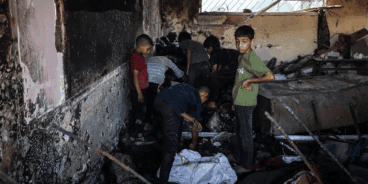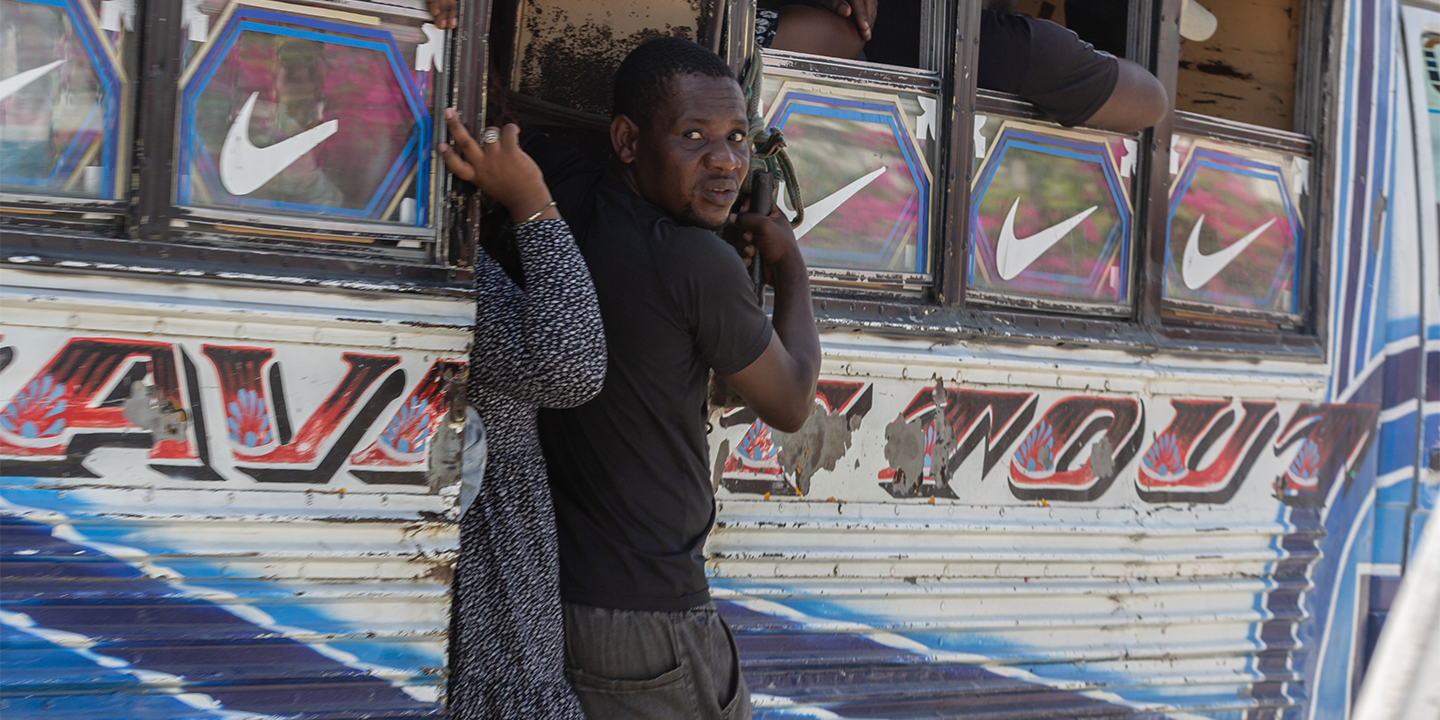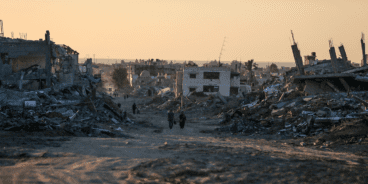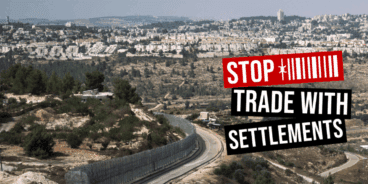

Atrocity Alert No. 439: Haiti, Central African Republic and Israel and the Occupied Palestinian Territory
Atrocity Alert is a weekly publication by the Global Centre for the Responsibility to Protect highlighting situations where populations are at risk of, or are enduring, mass atrocity crimes.
ESCALATING GANG VIOLENCE DEVASTATES HAITI’S ARTIBONITE REGION
Amid continued gang violence in Port-au-Prince, communities in Haiti’s central Artibonite department are also facing an onslaught of deadly attacks in recent weeks. The rural commune of Petite Rivière came under assault on 24 April, and within six days armed gangs reportedly seized control of the town’s northern area. Scores of homes were burned, police installations targeted and key agricultural infrastructure damaged, severely disrupting livelihoods. The European Commission’s Directorate-General for European Civil Protection and Humanitarian Aid Operations reported that at least 50 people were killed and 60 injured. The attacks have been attributed to Gran Grif – the largest gang operating in Artibonite.
The violence has triggered a new wave of displacement in an already fragile context. According to the International Organization for Migration, more than 16,000 people were displaced between 28 April and 3 May. Many are now sheltering in makeshift camps with limited access to clean water, food and healthcare. Videos on social media show dozens of people fleeing attacks by wading across the Artibonite River.
Gran Grif has a history of perpetrating grave abuses against civilians, including a massacre in Pont-Sondé that left 115 civilians dead and over 350 injured – one of the largest assaults in decades. Between January and March the UN Integrated Office in Haiti recorded at least 52 people killed and 20 injured by gangs in Artibonite. Most of the victims were killed indiscriminately or in shootings targeting their homes or vehicles. During March Gran Grif also ambushed a convoy of the UN-authorized Multinational Security Support Mission (MSS), killing a Kenyan police officer.
Over the last three years, gangs have increasingly launched attacks in the once peaceful Artibonite department, giving rise to a climate of fear and resulting in large parts of the region falling under gang control. The spread of violence to Artibonite, the nation’s breadbasket, has had devastating consequences, disrupting people’s livelihoods and compounding an already critical humanitarian emergency. Gangs have stolen crops and livestock, blocked irrigation systems, attacked and occupied agricultural lands, imposing taxes on farmers to access their own land. This has deepened food insecurity and worsened an already critical humanitarian crisis.
The World Food Programme’s Representative and Country Director, Wanja Kaaria, said, “This is the moment to step up. The future of Haiti depends on the actions we take today.” Stakeholders need to take urgent, coordinated action to ensure the Haitian National Police and MSS have the sufficient means to curb gang violence and protect vulnerable communities. The international community must also scale up funding for the UN’s humanitarian appeal for Haiti and support efforts by humanitarian agencies providing shelter, aid and psychosocial support to those fleeing atrocities.
TENSIONS SOAR IN SOUTHEAST CENTRAL AFRICAN REPUBLIC, INCREASING RISKS TO CIVILIANS
For over a month, civilians in Haut-Mbomou prefecture in southeastern Central African Republic (CAR) have faced worsening insecurity as deepening ethnic tensions and clashes between armed actors drive mass displacement and widespread fear. On 30 April fighting erupted between the Azandé Ani Kpi Gbé (AAKG) – a predominantly ethnic Azande armed group – and the CAR armed forces (FACA), supported by Russian mercenaries, in the towns of Obo, Zémio, Mboki and Bambouti. According to the UN, at least 10,000 people have been displaced, with many seeking shelter in churches or fleeing to neighboring Democratic Republic of the Congo. Witnesses report homes looted and burned, and sporadic automatic weapons fire.
The UN peacekeeping operation (MINUSCA) has strengthened its positions in Haut-Mbomou, conducting patrols to prevent future attacks, including at displacement sites. In Obo, panic erupted following rumors of mercenaries arriving to forcibly disarm AAKG fighters. Arsène Doukazima Kété, Obo’s municipal councilor, stated, “It’s fear that’s driving people to flee… The town is virtually empty. The population is traumatized by the recent events in Zémio and Mboki.” Similar displacement patterns have been reported in Bambouti.
Tensions began escalating in the area in mid-March after two Fulani men were found dead following a trip to Zémio to register to vote. The incident prompted calls by AAKG members to end voter registration and ban Muslims and non-Azande from Zémio. Days later a Kenyan UN peacekeeper was killed in an ambush, reportedly by an AAKG member. Violence escalated further in early April when Russian personnel arrested a leader of Wagner Ti Azandé (WTA, a group tied to FACA), who was suspected of orchestrating an attack on a humanitarian convoy that killed one aid worker and three Fulani civilians. On 4 April nearly 100 people attempted to storm the mayor’s residence demanding his release, triggering FACA to fire warning shots. Soon after, the AAKG abducted scores of civilians – signaling possible forced recruitment amid the deteriorating alliance with FACA and allied forces. Reports of Russian personnel routinely targeting Azande leaders with arrests have further deepened mistrust.
Though relative calm has returned to Zémio and Mboki, most residents remain in hiding or are unwilling to return without clear security guarantees. All armed actors – the AAKG, WTA, Russian mercenaries, FACA and other armed groups active in Haut-Mbomou – have perpetrated abuses, often along ethnic and religious lines. A joint report by MINUSCA and the UN Human Rights Office in March documented likely war crimes by the AAKG and WTA, primarily targeting Muslim and Fulani communities. The recent cycles of violence have also been marked by a sharp increase in hate speech against Muslims and Fulani, compounding tensions and risks of recurrence for atrocities.
CAR authorities must immediately confront hate speech and work with civil society and MINUSCA to support local peacebuilding efforts, including social cohesion initiatives and inter-communal dialogue. FACA and allied forces must ensure that all operations are impartial and non-discriminatory.
WARNINGS OF “GAZAFICATION” OF THE WEST BANK AS ISRAELI ASSAULT CONTINUES
For over 100 days Israel’s large-scale military assault in the Occupied West Bank has continued unabated with impunity. On 9 May the UN Committee on the Elimination of Racial Discrimination stressed that the “patterns of destruction, mass displacement, and settler violence [in the Occupied West Bank] increasingly mirror those witnessed in Gaza, by the continuing blockade imposed by Israeli authorities, the banning of [UN Relief and Works Agency for Palestine Refugees] UNRWA, as well as the systematic obstruction of life-saving humanitarian aid, particularly food and medicines.” Rights groups and some UN Security Council members have also expressed concern over the “Gazafication” of the territory.
The situation escalated further on 1 May when the Israeli military issued new demolition orders targeting over 100 homes in Tulkarem and Nur Shams Camps in northern Occupied West Bank – months after forcibly displacing nearly all of the residents from the camps. On 9 May Israel’s Supreme Court rejected an urgent petition demanding the cancellation of the mass demolition orders. The Court also dismissed a request for an interim injunction to block the demolitions and refused to hold hearings on the petition. Philippe Lazzarini, the Commissioner General of UNRWA, condemned Israel’s practice of mass demolitions as collective punishment of Palestinians.
Israel has also intensified its campaign against UNRWA, despite the agency’s protected status under international law. On 8 May Israeli forces forcibly entered three UNRWA schools in Shu’fat refugee camp in East Jerusalem, ordering the evacuation of over 550 children and detaining an UNRWA staff member. Consequently, UNRWA was forced to evacuate students in all six of its schools in East Jerusalem to ensure their safety.
Meanwhile, in response to Israel’s war on Gaza and illegal policies and practices across the Occupied Palestinian Territory (OPT), several international entities are severing ties with Israeli institutions and companies. On 11 May Norway’s sovereign wealth fund – the world’s largest – announced it would divest from another Israeli firm, the second in the last six months, over the energy company’s involvement in illegal settlements in the Occupied West Bank. The decision comes days after Norway’s largest trade union voted in support of enacting an economic boycott of Israel.
Israel must immediately halt its military assault across the Occupied West Bank and revoke legislation and policies targeting UNRWA. Third states, in compliance with the Advisory Opinion issued by the International Court of Justice, must ensure a rapid end to Israel’s unlawful presence in the OPT and refrain from providing any assistance that would sustain its continuation.
Related Content


Urgent Call to Action: International Community Must Uphold the Responsibility to Protect the Palestinian People
